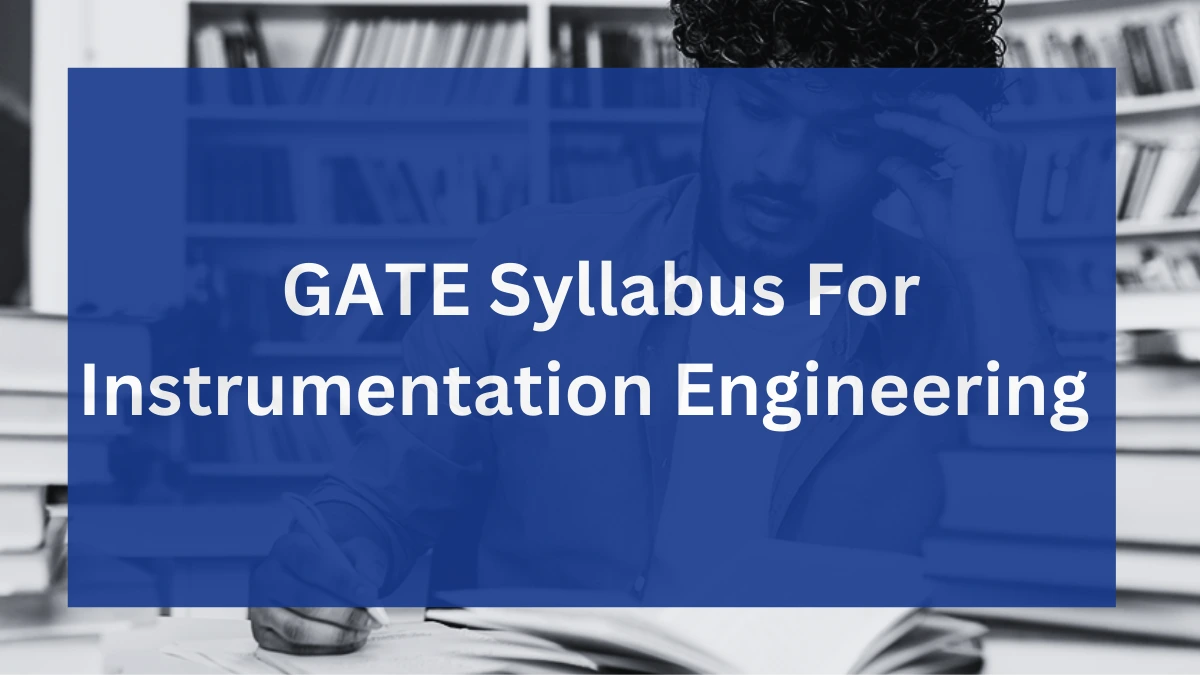GATE 2025 Syllabus for Instrumentation Engineering (IN)
The GATE instrumentation syllabus 2025 outlines the topics and subtopics covered in the instrumentation engineering discipline. The exam question papers are formulated based on the GATE Instrumentation Engineering Syllabus. The best way to ensure high scores is to plan and strategize for exam preparation based on the GATE Instrumentation Engineering Syllabus.

Aspirants must adequately plan and adopt strategic study approaches tailored to this syllabus. By doing so, not only will high marks become an objective, but it will also become a journey for those dedicated to excelling in their academic pursuits.
Prepare for the GATE Exam with Free GATE Mock Tests.
GATE Instrumentation Syllabus 2025
The topics and concepts included under the branch of instrumentation engineering are divided into ten main sections in the GATE Instrumentation Engineering Syllabus. The ten sections include:
- Engineering and Mathematics
- Electricity and Magnetism
- Electrical Circuits and Machines
- Signals and Systems
- Control Systems
- Analog Electronics
- Digital Electronics
- Measurements
- Sensors and Industrial Instrumentation
- Communication and Optical Instrumentation.
Read More: GATE exam syllabus 2025
Sections of the GATE Syllabus For Instrumentation Engineering 2025
Below are the sections of the GATE Syllabus for Instrumentation Engineering:
Section 1:
Engineering Mathematics
Linear Algebra:
The topics covered in this section are matrix algebra, systems of linear equations, Eigenvalues, and Eigenvectors.
Calculus: The topics covered in this section are theorems of integral calculus, mean value theorems, partial derivatives, multiple integrals, partial derivatives, vector identities, Fourier series, line, surface, and volume integrals, Gauss and Green’s theorems, and Stokes.
Differential Equations: This section includes first-order equations (linear and nonlinear), second-order linear differential equations with constant coefficients, variable separable method, method of variation of parameters, Cauchy’s and Euler’s equations, solution of partial differential equations, initial and boundary value problems and variable separable method.
Analysis of complex variables: The topics covered in this section are Taylor’s and Laurent’s series, analytic functions, Cauchy’s integral theorem and integral formula, residue theorem, and solutions of integrals.
Probability and Statistics: Sampling theorems, conditional probability, mean, median, mode, standard deviation and variance; random variables: discrete and continuous distributions: normal, Poisson and binomial distributions.
Numerical Methods: Solutions of nonlinear algebraic equations, matrix inversion, numerical integration, iterative methods of solving differential equations, regression, and correlation analysis are some topics covered in this section on numerical methods.
Read More: GATE Marking Scheme 2025: Subject Wise Paper Pattern
Section 2:
Electricity and Magnetism:
The topics included in this section are:
- Coulomb’s Law
- Electric Flux Density
- Electric field Intensiy
- Gauss’s Law
- Divergence
- Electric Field and Potential due to point, line, plane, and spherical charge distributions
- Effect of the dielectric medium
- The capacitance of simple configurations
- Biot-Savart’s Law
- Ampere’s Law
- Curl, Faraday’s Law
- Lorentz Force
- Inductance
- Magnetomotive Force
- Reluctance
- Magnetic Circuits
- Self and Mutual Inductance of Simple Configurations.
Section 3:
Electrical Circuits and Machines:
Voltage and Current Sources: The topics covered in this section are independent, dependent, ideal, and practical, v-i relationships of the resistor, mutual inductance and capacitor, inductor, and transient analysis of RLC circuits with DC excitation.
Kirchoff’s laws, mesh and nodal analysis, superposition, Thevenin, Norton, maximum power transfer and reciprocity theorems.
Peak-, average- and rms values of AC quantities; apparent-, active- and reactive powers; phasor analysis, impedance and admittance; series and parallel resonance, locus diagrams, realization of basic filters with R, L and C elements. transient analysis of RLC circuits with ac excitation.
One-port and two-port networks, driving point impedance and admittance, open and short circuit parameters.
Single phase Transformer:
Topics under this section include:
Equivalent circuit, phasor diagram, open circuit and short circuit tests, regulation and efficiency; Three phase induction motors: principle of operation, types, performance, torque-speed characteristics, no-load and blocked rotor tests, equivalent circuit, starting and speed control; Types of losses and efficiency calculations of electric machines.
Section 4:
Signals and Systems
The topics covered in this section are Laplace, periodic, aperiodic, and impulse signals, Z-transformers and Fourier, the frequency response of first and second-order linear time-invariant systems, the impulse response of systems, correlation, and convolution. Other topics include the Discrete time system that provides for impulse response, frequency response, pulse transfer function, FFT and DFT, and basics of IIR and FIR filters.
Section 5:
Control Systems
The topics of this section include signal flow graphs, feedback principles, steady-state errors, transient response, bode plot, phase and gain margins, Routh and Nyquist criteria, root loci, design of lead, lag and lead-lag compensators, time-delay systems, mechanical, hydraulic and pneumatic system components, synchro pair, servo and stepper motors, servo valves, on-off, P, PI, PID, cascade, feedforward and ratio controllers, sizing of control valves and PID controllers.
Section 6:
Analog Electronics:
The topics covered in this section are:
- Characteristics and applications of diode
- Zener Diode
- BJT and MOSFET
- Small Signal analysis or Transistor Circuits
- Feedback Amplifiers
- Characteristics of Ideal and Practical Operational Amplifiers
- Application of OPAMPS
- Added, Subtractor, Integrator, Differentiator, Difference Amplifier
- Instrumentation Amplifier
- Precision Rectifier
- Active Filters
- Oscillators
- Signal Generators
- Voltage-controlled oscillators and phase-locked loop
- Sources and Effects of noise and interference in electronic circuits
Section 7:
Digital Electronics
This section includes topics like:
- Combinational logic Circuits
- Minimization of Boolean Functions
- IC Families: TTL and CMOS
- Arithmetic Circuits, Comparators, Schmitt Trigger
- Multi-vibrators, Sequential circuits
- Flip flops, Shift Registers, Timers, and Counters
- Sample-and-hold circuit
- Multiplexer
- Analog-to-digital (Successive approximation, integrating, flash, and sigma-delta)
- Digital-to-analog converters (Weighted R, R-2R ladder, and current steering logic.)
- Characteristics of ADC and DAC (Resolution, Quantization, Significant bits, Conversion/Settling time)
- Basics of number systems
- Embedded Systems: Microprocessor and microcontroller applications
- Memory and input-output interfacing
- Basics of data acquisition systems
- Basics of distributed control systems (DCS)
- Programmable logic controllers (PLC).
Section 8:
Measurements:
- SI units
- Standards (R, L, C Voltage, Current, and Frequency)
- Systematic and Random errors in measurement
- Expression of uncertainty- Accuracy and Precision
- Propagation of errors
- Linear and Weighted Regression
- Bridges: Wheatstone, Meghom, Kelvin, Anderson, Maxwell, Schering, and Wien for measurement of R, L,C, and frequency.
- Q-meter
- Measurement of voltage, current, and power in single and three-phase circuits
- AC and DC current probes
- True RMS Meters
- Voltage and Current Scaling
- Instrument Transformers
- Timer/Counter
- Time, Phase, and Frequency Measurements
- Digital Voltmeter
- Digital Multimeter
- Oscilloscope
- Shielding and Grounding
Section 9:
Sensors and Industrial Instrumentation
- Resistive- Capacitive- Inductive- Piezoelectric
- Hall Effect Sensors and Associated Signal Conditioning Circuits
- Transducers for industrial instrumentation
- Displacement (Linear and Angular)
- Velocity, Acceleration, Torque, Force, Vibration, Shock, Pressure (including low pressure)
- Flow (Variable head, Variable Area, Electromagnetic, Ultrasonic, turbine and open channel flow meters)
- Temperature (Thermocouple, bolometer, RTD (¾ wire)
- Thermistors, Pyrometers, and Semiconductors
- Liquid level
- pH, conductivity, and viscosity measurement
- 4-20 two-wire transmitter
Section 10:
Communication and Optical Instrumentation
The topics included in this section are:
- Amplitude and Frequency modulation and demodulation
- Shannon’s sampling theorem
- Pulse code modulation
- Frequency and time division multiplexing
- Amplitude-Phase- Frequency- Quadrature Amplitude
- Pulse shift keying for digital modulation
- Optical sources and detectors: LED, photo-diode, light-dependent resistor, square law detectors, and their characteristics
- Interferometer: Applications in metrology, basics of fiber optic sensing
- UV-VIS Spectrophotometers
- Mass Spectrometer
Read More: GATE Cutoff – Check Paper & Category Wise CutOff
GATE Admit Card 2025: Hall Ticket Release Date, Steps to Download
GATE Instrumentation Syllabus: Topic-Wise Weightage
| GATE Instrumentation Engineering Exam 2025 – Topic Wise Weightage | ||
| GATE IN Topics | Number of Questions | Weightage |
| General Aptitude | 10 | 15% |
| Engineering Mathematics | 7 | 11% |
| Network Theory | 3 | 4% |
| Digital Circuits | 5 | 8% |
| Signals & Systems | 5 | 8% |
| Control Systems | 4 | 6% |
| Measurements | 8 | 12% |
| Analog Circuits | 5 | 8% |
| Communication | 2 | 3% |
| Transducers | 5 | 8% |
| Optical Instrumentation | 3 | 5% |
| Process Control | 1 | 1% |
In the Instrumentation Engineering GATE paper, it has been observed over the past few years that the difficulty level of the questions has fluctuated a lot. The level of questions has fluctuated between moderate to hard levels. You will correctly understand this while going through GATE Paper Analysis.
Frequently asked questions on GATE Instrumentation Syllabus(IN)
- Is there any change in GATE Instrumentation Syllabus?
The GATE Syllabus for Instrumentation Engineering has not undergone a major change, and the GATE IN Syllabus for 2025 is anticipated to be almost the same as the syllabus for 2024. - How can I download the main (official) GATE Instrumentation Syllabus?
IIT Roorkee has released the official GATE Instrumentation Engineering Syllabus on its official website. - How can I prepare the GATE Instrumentation Syllabus?
The candidates can prepare for the GATE Instrumentation Syllabus by following the preparation tips:
1. Identify the important topics
2. Understand the exam pattern
3. Attempt mock tests
4. Refer to standard books.
Read more: GATE Exam Pattern – Subject-Wise Question Paper Pattern, Marking Scheme
GATE Preparation Books – Best Books For GATE 2024







